What Does Neat Mean When Using Essential Oils
Essential oils have gained popularity for their numerous benefits, but what does it mean to use them “neat”? Is it safe to use essential oils neat, and what are the risks and benefits associated with it?
In this article, we will explore the world of using essential oils neat, how to do it properly, and which essential oils are safe to use in this way. We will also discuss how to dilute essential oils if using them neat is not recommended.
Let’s dive in and learn all about the world of essential oils and the concept of using them neat!
Key Takeaways:
What Are Essential Oils?
Essential oils are highly concentrated plant extracts that retain the natural aroma and flavor of their source. They are commonly used in aromatherapy, a holistic healing treatment that uses these oils to promote physical, mental, and emotional well-being.
These oils have been utilized for centuries in various cultures for their therapeutic properties, dating back to ancient civilizations like Egypt, Greece, and China. The essence of plants such as lavender, eucalyptus, peppermint, and tea tree is extracted through methods like steam distillation, cold pressing, or solvent extraction.
Peppermint oil, for example, is known for its cooling sensation, making it ideal for relieving headaches and muscle aches. Similarly, lavender oil is prized for its calming effects, often used to reduce stress and promote relaxation.
What Does Neat Mean When Using Essential Oils?
Using essential oils neat refers to the practice of applying the oil directly to the skin without dilution using a carrier oil. This method involves the direct topical application of undiluted essential oils.
While the neat application of essential oils can be convenient and time-saving, it is crucial to understand both its benefits and risks. The main advantage of applying oils neat is the immediate penetration into the skin, allowing for a rapid therapeutic effect. This direct contact can be too strong for sensitive skin, potentially leading to irritation, redness, or even chemical burns.
It is recommended always to perform a patch test before using essential oils neat to ensure compatibility with your skin type. Some oils are more skin-friendly when diluted, and using them neat might not provide the desired safe and effective outcome.
Is Using Essential Oils Neat Safe?
While using essential oils neat may seem convenient, it can pose risks such as skin sensitization, irritation, or allergic reactions due to the concentrated nature of undiluted oils. Safety precautions must be followed to prevent adverse effects.
One of the key safety considerations when using essential oils neat is the essential oil’s potency. Undiluted oils can overwhelm the skin, causing irritation or even burns. It is crucial to be aware of the specific properties of each oil and their safe usage levels.
Furthermore, patch testing before applying any essential oil neat is highly recommended. This involves diluting a small amount of the oil and applying it to a small area of skin to check for any adverse reactions before general use.
What Are The Benefits Of Using Essential Oils Neat?
The benefits of using essential oils neat include direct and immediate absorption into the skin, which can offer quick relief for individuals seeking prompt aromatherapy benefits or targeted skin applications.
One of the key advantages of applying essential oils neat is that it allows for a pure and undiluted experience, preserving the potency of the oils. This method is particularly favored by those who prefer a strong and concentrated aroma, as well as individuals with specific skin concerns requiring direct application.
- The fast-acting effects of neat application make it an ideal choice for those looking for immediate results, whether it’s to uplift mood or soothe muscle tension.
- The convenience of direct skin absorption also eliminates the need for carrier oils or other dilution methods, catering to individuals who prefer a straightforward and uncomplicated approach to using essential oils.
What Are The Risks Of Using Essential Oils Neat?
Despite its benefits, using essential oils neat can increase the risk of skin sensitivity, irritation, or adverse reactions, especially for individuals with sensitive skin or those prone to allergic responses.
When essential oils are applied directly to the skin, without proper dilution or testing, they can significantly increase the chances of developing redness, itching, or even more severe reactions such as blisters or burns. It’s crucial to remember that essential oils are highly concentrated substances that can interact differently with each individual’s skin chemistry. Conducting a small patch test before full application is essential to determine any potential adverse effects and prevent unwanted skin issues.
How To Use Essential Oils Neat?
When applying essential oils neat, it is crucial to perform a patch test on a small skin area to check for sensitization or adverse reactions before full application. Directly apply a small amount of the oil to the skin and observe for any negative responses.
After conducting the patch test, you can proceed with the full application if there are no adverse reactions.
When applying the essential oil neat to the skin, it is important to use gentle, upward motions to massage it in. This helps in better absorption and distribution of the oil.
Make sure to avoid sensitive areas of the skin, such as around the eyes and mucous membranes, as these areas can be more prone to irritation.
Spot Treatment

When applied neat, essential oils have a concentrated effect due to their potent properties, making them effective for targeted skin issues. Common skin concerns like acne, eczema, and scars can benefit from this direct application method, as the oils can penetrate deeply into the skin layers to promote healing and reduce inflammation.
The action of neat application allows for quicker absorption and immediate soothing relief, making it a convenient and efficient way to address minor skin irritations. By zeroing in on problem areas, essential oils neat can deliver powerful results without the need for dilution, maximizing their effectiveness.
Inhalation
Inhalation of essential oils neat involves directly inhaling the concentrated aroma from the undiluted oil to experience the therapeutic benefits and promote a sense of well-being through aromatherapy.
When inhaling essential oils neat, the molecules quickly reach the olfactory system, stimulating the brain region responsible for emotions and memories. This direct pathway can evoke profound emotional responses, aiding in stress relief, improved focus, and relaxation.
This method also boasts direct effects on the respiratory system, helping to clear congestion, soothe irritated airways, and support overall respiratory health. The potent nature of undiluted essential oils makes them effective in promoting deep breathing and enhancing oxygen intake.
For safe inhalation, it is crucial to practice moderation and use oils known for their respiratory and emotional benefits. Opt for calming lavender or invigorating eucalyptus for a balanced experience.
Diffusion
Diffusion of essential oils neat involves dispersing the concentrated oil particles into the air using a diffuser to create a fragrant and therapeutic environment that promotes relaxation, mental clarity, or other desired effects.
Aromatherapy diffusion, through the use of essential oils neat, is a popular method for enhancing well-being through the power of scent. By using a diffuser, which can be ultrasonic, nebulizing, heat, or evaporative type, the essential oils are released into the air in a gentle and controlled manner. Each diffuser type has its benefits and characteristics, but the common goal is to disperse the oils effectively. The diffused oils can have a direct impact on mood, helping alleviate stress, anxiety, or even boosting energy levels.
Bathing
Adding essential oils neat to bathwater can create a luxurious and aromatic bathing experience, allowing for skin absorption of the oils’ beneficial properties and enhancing relaxation or skin care benefits.
When essential oils are added directly to bathwater without dilution, the oils get directly absorbed into your skin, providing deep hydration and nourishment. The fragrance of the oils can also help in relaxation and stress relief, turning your bath into a spa-like experience.
To incorporate essential oils into your bath routine, simply add a few drops to the running water just before entering the tub. Swirl the water gently to disperse the oils evenly. Make sure to choose oils that are safe for topical application to avoid skin irritation.
Compress
Creating a compress with essential oils neat involves soaking a cloth in a diluted oil mixture and applying it to the skin to relieve muscle tension, reduce inflammation, or address localized pain and discomfort.
When using essential oils neat in compresses, it is crucial to select oils with properties that suit the desired outcome. For example, lavender oil is known for its calming effects, making it ideal for relaxation and stress relief, while peppermint oil can provide a cooling sensation to soothe headaches or muscle aches.
The application method is simple yet effective – after soaking the cloth in the oil mixture, wring out the excess liquid and place the compress on the affected area for a specified duration. This allows the skin to absorb the oils directly, enhancing their therapeutic benefits.
Conditions such as arthritis, menstrual cramps, or even sunburn can benefit from this treatment, as the direct application of potent oils can help alleviate symptoms and promote healing. Always remember to perform a patch test and consult with a healthcare professional, especially for individuals with sensitive skin or certain medical conditions.
What Essential Oils Can Be Used Neat?
Several essential oils can be used neat due to their gentle nature and skin-friendly properties. Some commonly used oils in undiluted form include Lavender, Tea Tree Oil, Peppermint Oil, Eucalyptus Oil, and Lemon Oil.
When applied directly to the skin, Lavender oil is known for its calming and soothing properties, making it ideal for promoting relaxation and aiding in sleep. This gentle oil is well-suited for all skin types, including sensitive skin, and can help alleviate skin irritations or minor burns.
Tea Tree Oil, with its natural antibacterial and antifungal properties, is great for addressing acne-prone skin and scalp issues. It can be applied neat to blemishes or mixed with a carrier oil for larger skin areas.
Peppermint Oil is invigorating and refreshing, offering relief from headaches and nausea. This oil can be safely applied neat to temples for headache relief or diluted in a carrier oil for massages.
Eucalyptus Oil is commonly used for respiratory support and can be applied neat on the chest or diffused to help clear congestion and ease breathing.
Lemon Oil is energizing and uplifting, promoting mental clarity and focus. It can be used neat on the skin as a natural toner or diluted in a carrier oil for a refreshing massage.
Lavender Oil
Lavender oil is a versatile essential oil known for its calming and soothing properties, making it ideal for neat application to promote relaxation, improve sleep quality, and soothe skin irritations.
When used topically, lavender oil can help reduce feelings of stress and anxiety through its aromatic benefits. It also possesses properties that can aid in treating minor burns, cuts, and insect bites due to its natural antiseptic qualities.
In skincare, lavender oil is popular for its ability to soothe and nourish the skin, making it a common ingredient in creams, lotions, and balms. Its anti-inflammatory properties can help calm redness and reduce the appearance of blemishes.
Tea Tree Oil

Tea Tree Oil, derived from the leaves of the Melaleuca tree, has been used for centuries for its powerful healing properties. Its antiseptic benefits make it a popular choice for treating various skin conditions, including cuts, insect bites, and eczema. When using Tea Tree Oil neat, it is essential to conduct a patch test on a small area of skin before widespread use to avoid adverse reactions.
Although Tea Tree Oil is generally safe for most individuals, some people may experience allergic reactions or skin sensitization, especially if used in high concentrations. To minimize risks, it is crucial to dilute the oil with a carrier oil before applying it to the skin.
Peppermint Oil
Peppermint Oil offers a refreshing and invigorating aroma that can uplift mood and alleviate headaches when used neat. Its cooling sensation also makes it a popular choice for muscle relaxation and digestive support.
Its invigorating scent not only stimulates the mind but can also help to reduce feelings of nausea and promote a sense of focus. The menthol component in Peppermint Oil is known for its analgesic properties, providing relief from sore muscles and tension headaches. When applied topically, it can create a soothing and numbing effect, making it useful for managing minor discomforts.
Eucalyptus Oil
Eucalyptus Oil is valued for its fresh, camphoraceous aroma and respiratory benefits when used neat. It can help clear congestion, support respiratory health, and provide a rejuvenating experience during inhalation.
Eucalyptus Oil is a versatile essential oil that is renowned for its exceptional therapeutic properties. Along with its respiratory benefits, it is widely appreciated for its soothing properties, making it a popular choice for aromatherapy and wellness routines. The invigorating scent of eucalyptus is not just refreshing but also has a calming effect on the mind and body.
When used in a diffuser or added to a warm bath, the aromatic vapor can promote easier breathing and alleviate sinus discomfort. To harness the full potential of eucalyptus oil for respiratory support, a few drops can be added to a bowl of hot water for inhalation or blended with a carrier oil for a comforting chest rub. Its natural decongestant properties make it a go-to remedy for seasonal respiratory challenges and cold symptoms.
Lemon Oil
Lemon Oil is a bright and uplifting essential oil that can be used neat to enhance mood, boost energy, and support mental clarity. Its citrusy scent makes it a popular choice for aromatherapy and household cleaning.
One key benefit of Lemon Oil is its mood-enhancing effects, which can help alleviate feelings of stress and anxiety. Its versatile uses extend beyond aromatherapy to include natural disinfecting properties for cleaning surfaces and adding a refreshing aroma to homemade beauty products. It is important to note that when applying Lemon Oil topically, it is recommended to dilute it with a carrier oil to avoid skin sensitivity or reactions.
How To Dilute Essential Oils If Not Using Neat?
Diluting essential oils is essential when not using them neat to reduce skin irritation and enhance absorption. Carrier oils like coconut, almond, or jojoba oil are commonly used to dilute essential oils for safe topical application.
While essential oils hold numerous therapeutic properties, they are highly concentrated and can cause adverse effects if applied directly to the skin. By blending them with carrier oils, such as almond, coconut, or jojoba oil, the potency of the essential oils is reduced, making them safe for use on the skin.
Each carrier oil has its unique benefits; for instance, jojoba oil closely resembles the skin’s natural oils, making it ideal for facial skincare blends. Coconut oil, on the other hand, has antimicrobial properties, enhancing the overall effectiveness of the essential oils.
When diluting essential oils, it is crucial to maintain the correct ratios to ensure both safety and efficacy. The typical dilution ratio for adults is 2-3% (or about 12-18 drops of essential oil per ounce of carrier oil).
Carrier Oils
Carrier oils are neutral, plant-based oils used to dilute essential oils for topical application, ensuring safe use and proper absorption while also providing additional skin benefits. Common carrier oils include Coconut, Almond, and Jojoba oil.
Each carrier oil has unique properties that can cater to different skin types and conditions. For instance, Coconut oil is deeply moisturizing, making it ideal for dry skin, while Almond oil is gentle and soothing, suitable for sensitive skin. Jojoba oil closely mimics the skin’s natural oils, making it a versatile option for various skin concerns.
When blending carrier oils with essential oils, it’s crucial to follow recommended dilution ratios to avoid skin irritation or sensitization. A common guideline is to use 1-2% essential oil in carrier oil for facial products and up to 5% for body products.
Water
Water can be used to dilute essential oils for various purposes, such as creating room sprays, linen mists, or refreshing facial mists. It is essential to use a proper emulsifier to ensure the oil and water mix effectively.
Emulsifiers play a crucial role in water-based dilutions as they help prevent separation of the oil and water components. When making DIY essential oil sprays, incorporating emulsifiers like polysorbate 20 or vegetable glycerin ensures that the oils disperse evenly and do not float on the surface of the water.
Safety is paramount when using water as a diluting agent for essential oils. Always use distilled or purified water to avoid contaminants that can impact the quality and shelf life of your blend. Remember that water-based mixtures may require preservatives to prevent bacterial growth.
Other Substances

Along with aloe vera gel, which is renowned for its soothing and hydrating properties, lotions and unscented creams offer a velvety texture that can make the application of essential oils more pleasant and effective. They act as superb carriers, ensuring proper absorption of the oils into the skin.
Each of these substances pairs differently with various essential oils due to their unique compositions. For instance, aloe vera gel works exceptionally well with calming oils like lavender, while lotions may be better suited for citrus or minty scents.
These alternative substances provide a diverse range of uses, allowing for customized blends tailored to specific skincare needs. They offer a versatile approach to dilution methods that can cater to individuals with varying skin types and preferences.
Frequently Asked Questions
What does “neat” mean when using essential oils?
When using essential oils, “neat” refers to applying the oil directly to the skin without dilution.
Is it safe to use essential oils neat?
Using essential oils neat is generally safe, but it is important to use caution and do a patch test first to make sure you are not sensitive to the oil.
Can I use any essential oil neat?
No, not all essential oils are safe to use neat. Some oils, such as cinnamon or oregano, can be too strong and may cause skin irritation. It is important to do your research and consult a trained aromatherapist before using any essential oil neat.
What is the benefit of using essential oils neat?
Using essential oils neat can provide a more potent and immediate effect, as the oil is not diluted. This can be helpful for certain conditions or in aromatherapy practices where the oil is used to target specific areas of the body.
Can I use essential oils neat on children?
It is not recommended to use essential oils neat on children. Children have more sensitive skin and may react differently to oils than adults. It is best to dilute essential oils when using them on children.
What are some alternatives to using essential oils neat?
If you are not comfortable using essential oils neat, you can dilute them with a carrier oil, such as coconut or almond oil. You can also use a diffuser to enjoy the aroma of the oils without directly applying them to your skin.







